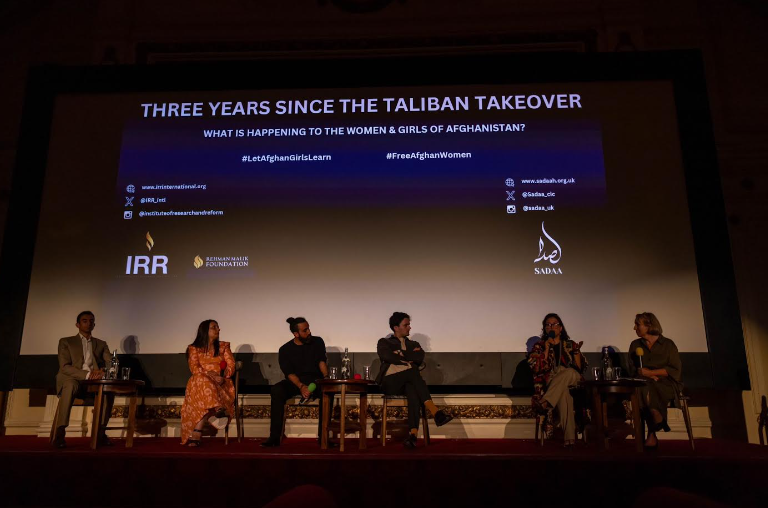Stop gender apartheid in Afghanistan

PRESS RELEASE – FOR IMMEDIATE USE
London, United Kingdom – Electric House, Soho House – 15 August 2024
Marking three years since the Taliban seized power in Afghanistan, the Institute of Research & Reforms (IRR), in collaboration with SADAA and the Rehman Malik Foundation, hosted an event at Soho House today to highlight the plight, oppression and suffering of the women and girls in Afghanistan. The event focused on the ongoing gender apartheid and human rights violations.
The event brought together human rights activists, policymakers, journalists, and concerned citizens to shed light on the grave situation facing the women and girls in Afghanistan.
Speakers included Baroness Hussein-Ece, member of the House of Lords; Elham Ehsas, BAFTA nominated & Oscar shortlisted writer and director; Mandy Sanghera, award-winning philanthropist and human rights activist; Sarah Sands, member of the G7 Gender Equality Advisory Council and former editor of Today on BBC Radio 4; Anil Qasemi, project lead – Afghan Resettlement at Universal Sponsorship Pathway UK; Tim Walker, journalist, author and broadcaster; Ali Rehman Malik, chairman of the Institute of Research & Reforms and the Rehman Malik Foundation; and, Shabnam Nasimi, executive director of SADAA & Afghan women’s rights advocate.
The Institute of Research & Reform was commended for successfully evacuating 40 female athletes and their families from Afghanistan, who were at high risk under Taliban rule. They have now been resettled in safer environments thanks to IRR’s relentless efforts.
Ali Rehman Malik, speaking on behalf of the Institute of Research & Reforms and the Rehman Malik Foundation, highlighted the devastating impact of Taliban rule on Afghan women, particularly young girls. He stressed the importance of international solidarity in addressing these atrocities and urged continued support for the Afghan population in their struggle for basic human rights and freedoms.
The discussions concluded with a strong call for the international community to intensify efforts to combat these human rights violations. Participants were encouraged to advocate for policy changes, support humanitarian efforts, and raise awareness about the gender apartheid occurring in Afghanistan.
Baroness Hussein-Ece, member of the House of Lords, said: “It’s been three years since the Taliban took over Afghanistan. The news cycle may have moved on but Afghan women are still fighting human rights abuses that amount to gender apartheid. This week Afghan women protested peacefully against Taliban oppression. They chanted: “No to gender apartheid. The Taliban must know they cannot silence us with their guns.” Despite imprisonment, and torture, they persist. We stand in solidarity with them.”
Elham Ehsas, BAFTA nominated & Oscar shortlisted writer and director, said: “Afghanistan is the only country in the world that bans women from a full education. It’s time that the international community engage and promote the rights of women in Afghanistan.”
Mandy Sanghera, award-winning philanthropist and human rights activist, said: “As someone who has evacuated over 400 Afghans, I am glad to be involved in today’s important event. I want afghans to know that they are not alone. We need to be a voice for the women and children of Afghanistan whose lives are being destroyed by the Taliban. We need them in schools and colleges. We don’t want them to be forgotten because of all the other ongoing conflicts.”
Tim Walker, journalist and broadcaster, said: “It shames the West that one of the key justifications for invading Afghanistan was to empower its women. When we withdrew, we betrayed them. We have a moral responsibility now not to forget and abandon them.”
Sarah Sands, member of the G7 Gender Equality Advisory Council and former editor of Today on BBC Radio 4, said: “We cannot ignore the three million girls out of school in Afghanistan. We shall not forget them. This evening we show our solidarity with them.”
Anil Qasemi, project lead – Afghan Resettlement at Universal Sponsorship Pathway UK, said: “In our efforts to resettle Afghan refugees in the UK, particularly women who have been most affected, we have the opportunity to make a meaningful difference. I hope we can continue to support these individuals as they rebuild their lives, while also contributing to a brighter future for Afghanistan as a whole.”
Ali Rehman Malik, chairman of the Institute of Research & Reforms and the Rehman Malik Foundation, said: “We cannot allow the status quo to be normalised. We must continue our support of the women and girls of Afghanistan as they fight against gender apartheid.”
Shabnam Nasimi, executive director of SADAA & Afghan women’s rights advocate, said: “Three years of darkness for the women and girls in Afghanistan. Imprisoned at home and deprived of their basic human rights to an education. We must not let this go on. Stand & speak up for them”.
